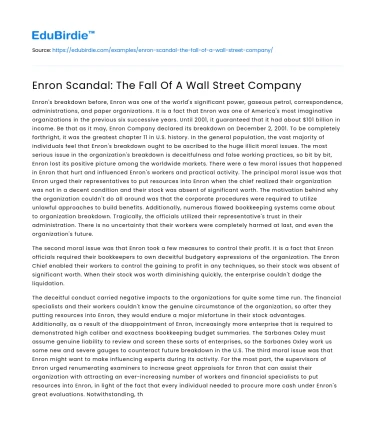Introduction
The Enron scandal stands as one of the most infamous corporate collapses in history, epitomizing the catastrophic consequences of fraudulent accounting practices and corporate malfeasance. At the height of its success, Enron was lauded as a Wall Street powerhouse, a paragon of innovation that transformed the energy industry. However, beneath its gleaming facade lay a web of deceit and financial manipulation. The fall of Enron not only led to the largest bankruptcy reorganization in American history at the time but also resulted in significant regulatory and legislative changes aimed at curbing corporate fraud. This essay examines the factors that contributed to Enron's downfall, the role of corporate governance failures, and the long-lasting impact of the scandal on financial regulations and corporate ethics.
Corporate Culture and Financial Manipulation
Enron's corporate culture was characterized by arrogance, aggressive risk-taking, and a relentless pursuit of earnings growth, which ultimately laid the groundwork for its downfall. The company employed complex financial instruments, such as special purpose entities (SPEs), to conceal its mounting debt and inflate profitability. These entities, which were ostensibly separate businesses, allowed Enron to keep substantial liabilities off its balance sheet, creating a misleading picture of financial health. According to McLean and Elkind (2003), authors of "The Smartest Guys in the Room," Enron's executives, including CEO Jeffrey Skilling and CFO Andrew Fastow, exploited these accounting loopholes to enrich themselves and artificially sustain the company's stock price.
Save your time!
We can take care of your essay
- Proper editing and formatting
- Free revision, title page, and bibliography
- Flexible prices and money-back guarantee
The lack of transparency and the deliberate obfuscation of financial statements signified a profound ethical breach within Enron's leadership. The company also fostered a culture of fear and intimidation, where employees were pressured to meet unrealistic financial targets by any means necessary. This toxic environment discouraged whistleblowing, allowing the fraudulent activities to persist unchecked. As a result, Enron's stock soared to unsustainable levels, providing a false sense of security to investors and stakeholders. The company's eventual bankruptcy in December 2001 wiped out over $60 billion in market value, devastating employees' retirement accounts and shaking investor confidence in corporate America.
Failures in Corporate Governance
The Enron scandal underscored significant failures in corporate governance, highlighting the lack of oversight by the board of directors and external auditors. The board, whose primary responsibility was to ensure accountability and protect shareholder interests, failed to question the opaque financial practices and aggressive accounting strategies employed by Enron's executives. In addition, Arthur Andersen, Enron's accounting firm, was implicated for its role in approving misleading financial statements and destroying audit documents, further eroding trust in the auditing profession.
The complicity of external auditors and weak internal controls allowed Enron's fraudulent activities to continue unabated. This lack of effective oversight was exacerbated by conflicts of interest, as Arthur Andersen provided both auditing and consulting services to Enron, raising questions about its objectivity and independence. A report by the U.S. Senate's Permanent Subcommittee on Investigations (2002) highlighted how Enron exploited these conflicts to manipulate financial results, with little resistance from its auditors. The scandal emphasized the need for stricter corporate governance standards and led to the enactment of the Sarbanes-Oxley Act of 2002, which imposed rigorous requirements for financial transparency and auditor independence.
Regulatory and Ethical Repercussions
The fallout from the Enron scandal reverberated throughout the financial industry, prompting a reevaluation of regulatory frameworks and corporate ethics. The Sarbanes-Oxley Act, enacted in response to Enron and similar corporate scandals, aimed to restore public confidence by enhancing corporate accountability and increasing penalties for fraudulent financial activities. This legislation mandated greater transparency in financial reporting, established the Public Company Accounting Oversight Board (PCAOB) to oversee audits, and required top executives to personally certify the accuracy of financial statements.
In addition to regulatory changes, the Enron scandal served as a catalyst for a broader cultural shift towards ethical corporate behavior and responsible leadership. Companies began to prioritize ethical training and establish robust compliance programs to prevent future malfeasance. Despite these advances, critics argue that legislation alone cannot fully eliminate corporate fraud, as it stems from deeper issues of corporate greed and ethical lapses. The debate continues on whether the regulatory measures implemented post-Enron have been sufficient in deterring similar scandals or if further reforms are necessary to safeguard investor interests.
Conclusion
The Enron scandal remains a stark reminder of the potential for corporate greed and unethical practices to wreak havoc on the economy and public trust. It exposed critical vulnerabilities in corporate governance and underscored the importance of transparency, accountability, and ethical leadership. While regulatory measures like the Sarbanes-Oxley Act have sought to mitigate these risks, the onus remains on corporations to cultivate cultures of integrity and responsibility. As financial markets evolve and new challenges emerge, the lessons from Enron's collapse continue to inform discussions on corporate ethics and regulatory oversight. Ultimately, the Enron saga serves as a cautionary tale, emphasizing the need for vigilance and reform to prevent history from repeating itself.






 Stuck on your essay?
Stuck on your essay?

